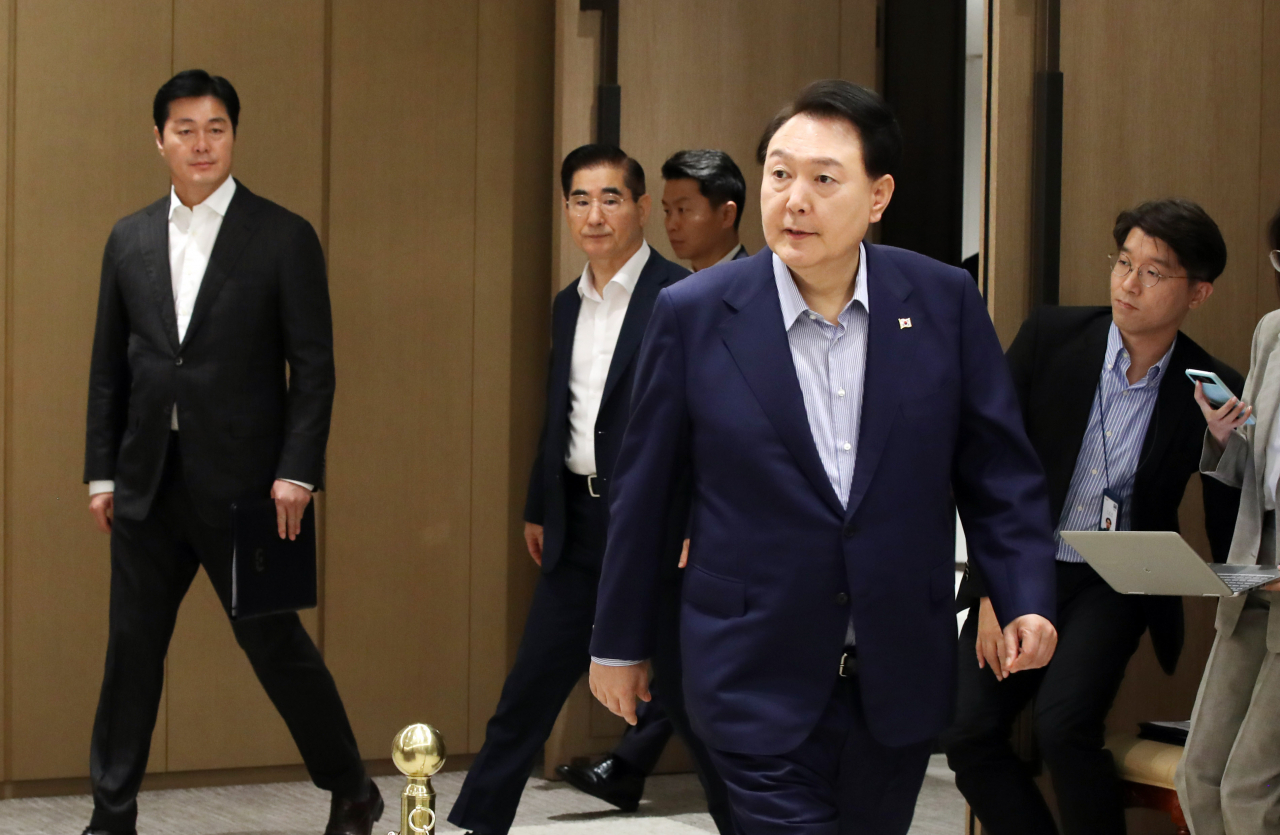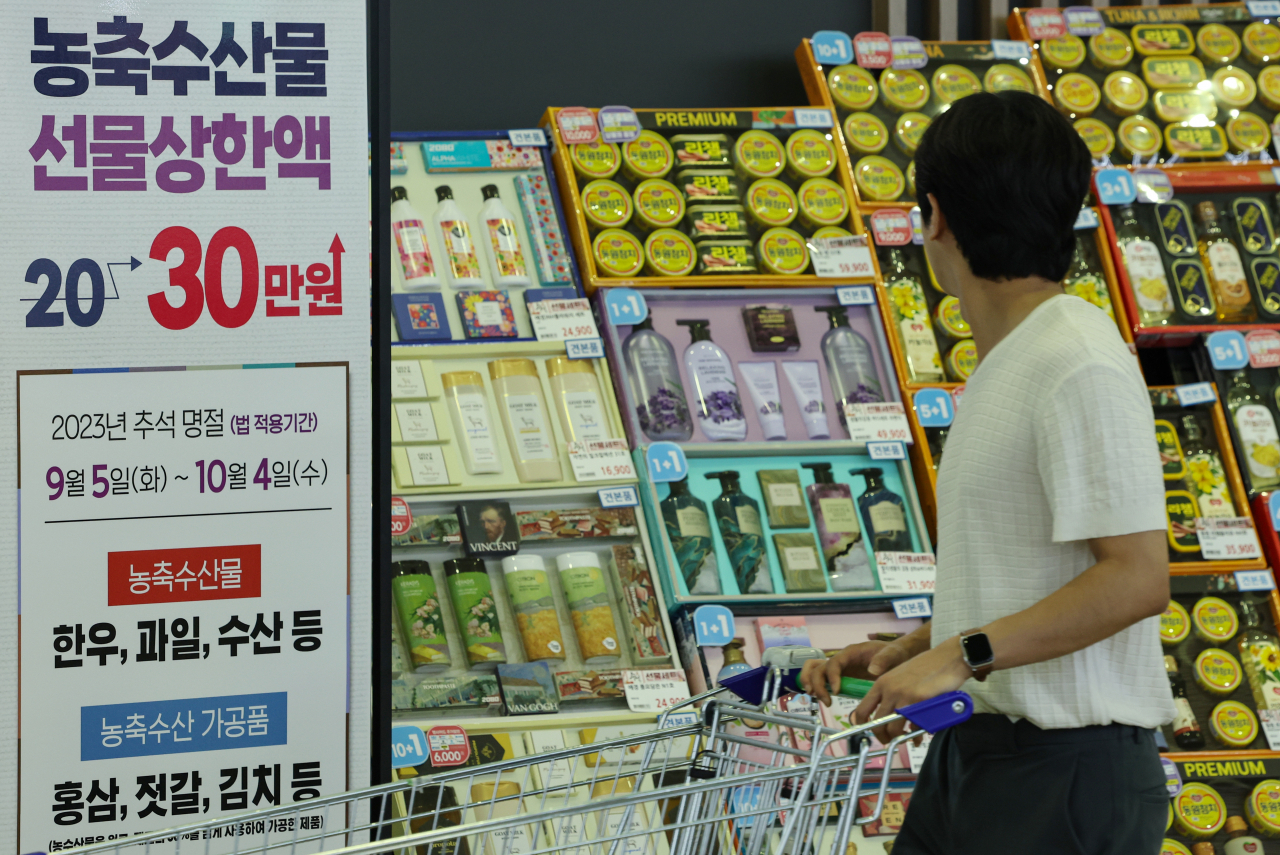 |
President Yoon Suk Yeol (front) enters the presidential office meeting room to preside over the Emergency Meeting on Economic Affairs in Seoul, Thursday. (Joint Press Corps) |
South Korea will have a six-day Chuseok holiday this year, as the government plans to designate Oct. 2 as a one-off temporary holiday in a move aimed at shoring up domestic economy.
President Yoon Suk Yeol confirmed the plan on Thursday at the 19th Emergency Meeting on Economic Affairs for Examining Economic Promotion Strategies held in his office in Seoul.
If the plan proceeds as planned, all Korean citizens will be eligible to enjoy a six-day break spanning from Sept. 28 to Oct. 3. The Chuseok holiday, the Korean equivalent of Thanksgiving, will fall on three days from Sept. 28 to 30, while Koreans celebrate National Foundation Day on Oct. 3. Oct. 1 is a Sunday.
Yoon called on the Cabinet to increase its efforts to stabilize household incomes, primarily by revitalizing domestic tourism of Korean citizens, as the meeting centered on the ministries' execution plans before Chuseok holiday begins.
"Domestic tourism should be revitalized so the domestic economy can improve," Yoon said, adding that the administration will dole out some 600,000 discount offers for domestic accommodation facilities and carry out toll fee exemption throughout the long holiday.
The Cabinet is likely to deliberate the plan next Tuesday, according to reports.
Yoon also expressed hopes that the increased number of foreign tourists would contribute to revitalizing the economy, with his pledge to increase the number of flights departing from and arriving in Korea.
Entry process for inbound tourists from abroad will be streamlined, and convenient mobile payment methods will be offered.
 |
A shopper walks past gifts for Chuseok displayed at a hypermarket in Seoul on Tuesday. (Yonhap) |
Separately, Yoon said 67 billion won ($50.6 million) of financial aid will be used to help stabilize the price of agricultural goods, seafood and livestock, allowing them to be sold 5 percent cheaper than the previous year's level weeks before the Chuseok holiday.
This comes amid widening global commodities price volatility and the uncertainties stemming from the fallout from Korea's torrential rain in July and Typhoon Khanun that traversed the Korean Peninsula in early August. The Bank of Korea last week projected the national economy to grow by 1.4 percent through 2023.
Another point of concern is Japan's release of over 1.3 trillion cubic meters of treated wastewater from quake-stricken Fukushima Dai-ichi power plant that started on Aug. 24.
The Yoon administration is working to allay public concerns about the release of radioactive water to the Pacific Ocean. Yoon said an 80 billion won supplementary spending package would be provided using budget reserves to prop up Korean seafood consumption.
On Tuesday, the Cabinet approved a presidential proposal to ease the Improper Solicitation Act in Korea by allowing Koreans to exchange gifts made of agricultural or marine produce worth up to 300,000 won weeks before the national holiday seasons of the Lunar New Year or Chuseok. The act is colloquially known as the Kim Young-ran Act, after the former head of the Anti-Corruption and Civil Rights Commission.






![[Today’s K-pop] Blackpink’s Jennie, Lisa invited to Coachella as solo acts](http://res.heraldm.com/phpwas/restmb_idxmake.php?idx=644&simg=/content/image/2024/11/21/20241121050099_0.jpg)
